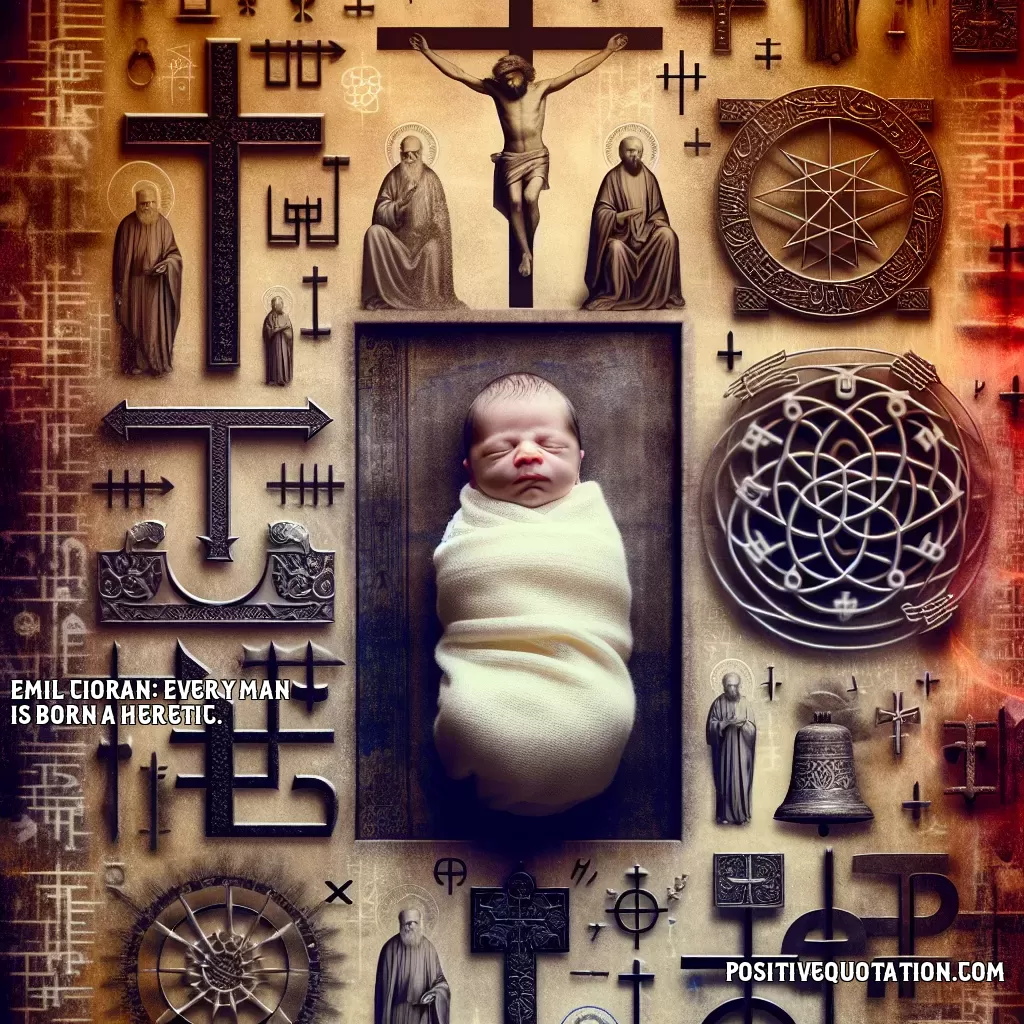
Emil Cioran: Every man is born a heretic.
Author: Emil Cioran
👁️ 10 views
Emil Cioran's quote, "Every man is born a heretic," can be unpacked to reveal profound insights into human nature and the development of individual belief systems. At its core, the statement suggests that every person initially enters the world free of predetermined beliefs or doctrines, much like a blank slate. A heretic is commonly understood as someone who challenges established beliefs or doctrines, especially in a religious context. Therefore, by stating that every person is born a heretic, Cioran implies that humans are naturally predisposed to question, challenge, and potentially defy the pre-existing norms or conventions that they encounter as they grow and learn. This concept aligns with the idea that each person is inherently curious and possesses an innate capacity for independent thought. From a young age, individuals are naturally inquisitive, often questioning the rationale behind rules and the status quo, which is a fundamental aspect of intellectual and personal development. As people mature, they encounter various belief systems—religions, cultural norms, societal structures—and they must navigate these as they form their own identities. Cioran's assertion can also be seen as a commentary on the nature of individuality in the face of societal expectations. It underscores the tension between conformity and individuality, suggesting that while society often encourages uniformity in thought and behavior, the essence of being human includes the ability to think critically and make one's own judgments. In this light, everyone starts as a "heretic," possessing an inherent skepticism that propels personal growth, innovation, and progress. Rather than blindly accepting what is given, humans have the potential to question and redefine their beliefs as they seek their own truths.
Quote By: Emil Cioran
Emil Cioran, a Romanian philosopher and essayist, was born on April 8, 1911, in Rășinari, a small village in Transylvania. Known for his profound and often pessimistic insights into the human condition, Cioran's work traverses themes of despair, existentialism, and the absurd. His early education in Sibiu and later in Bucharest laid the foundation for his literary and philosophical pursuits. In 1937, Cioran published his first book, "On the Heights of Despair," which quickly established him as a notable voice in Romanian literature.
After moving to Paris in 1937, Cioran embraced the French language and began writing in it, ultimately becoming a significant figure in French literature. His unique style marries lyrical prose with philosophical reflection, and his works often delve into the bleakness of human existence. In the tumultuous backdrop of the 20th century, Cioran’s writings resonate with the disillusionment and uncertainty of the era. He became associated with the existentialist movement, although he often disavowed its more optimistic philosophies.
Throughout his career, Emil Cioran produced several notable works, including "The Trouble with Being Born," "A Short History of Decay," and "The temptation to exist." His writings are characterized by a deep, almost poetic exploration of themes such as suffering, mortality, and the futility of existence. Cioran’s philosophy, often steeped in nihilism, invites readers to confront the absurdity of life and the inevitability of death, prompting introspection on the nature of existence itself.
Despite his bleak outlook, Emil Cioran's influence extends beyond the confines of despair; he has inspired countless readers and thinkers with his incisive observations and stylistic brilliance. He lived in Paris until his death on June 20, 1995, leaving behind a legacy of philosophical insight that continues to captivate audiences around the world. Cioran remains a significant figure in literary and philosophical discussions, celebrated for his ability to articulate the complexities of the human experience.